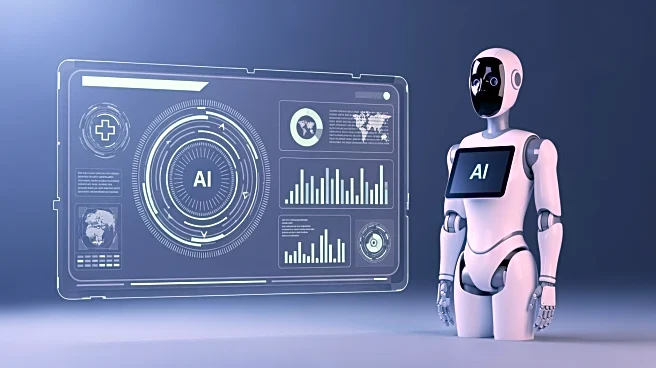What's Happening?
The healthcare industry is witnessing a surge in AI-driven initiatives, as highlighted by recent strategic partnerships and product launches. Eleos has introduced Polaris AI for post-acute care, developed
in collaboration with Google Cloud, to enhance behavioral health services. Ada Health and Fullspan Health have partnered to integrate clinical AI, aiming to reduce treatment times and close diagnostic gaps in areas such as autoimmune conditions and women's health. Verizon Business, alongside Ericsson, is deploying Neutral Host and Private 5G Networks with healthcare providers like AdventHealth and Tampa General Hospital to support mission-critical operations and future AI applications. Additionally, Machinify has acquired Performant Healthcare for $670 million, expanding its AI-powered payment intelligence platform to serve a broader range of clients, including government programs.
Why It's Important?
These developments underscore the growing importance of AI in transforming healthcare delivery and operations. The integration of AI technologies promises to enhance patient care by providing personalized guidance and improving diagnostic accuracy. The deployment of 5G networks by Verizon Business is set to revolutionize healthcare connectivity, enabling high-bandwidth and low-latency applications crucial for AI-driven solutions. Machinify's acquisition of Performant Healthcare highlights the increasing focus on payment accuracy and efficiency in healthcare financial operations. These advancements are poised to benefit healthcare providers, patients, and payers by streamlining processes, reducing costs, and improving outcomes.
What's Next?
The healthcare industry is likely to see further integration of AI technologies, with ongoing partnerships and acquisitions driving innovation. As AI becomes more embedded in healthcare systems, stakeholders can expect enhanced interoperability and data exchange, leading to improved patient engagement and reduced acquisition costs. The focus on women's health, as seen with Transcarent's expansion, suggests a growing recognition of the unique healthcare needs of women, which may lead to more tailored solutions. Additionally, the appointment of new clinical leadership and supply chain expertise indicates a strategic move towards optimizing healthcare operations and ensuring the effective implementation of AI solutions.
Beyond the Headlines
The ethical implications of AI in healthcare, particularly concerning data privacy and security, remain a critical consideration. As AI technologies become more prevalent, healthcare providers must navigate the challenges of maintaining patient confidentiality while leveraging AI's capabilities. The cultural shift towards preventive care and personalized medicine, driven by AI, may also influence public health policies and societal attitudes towards healthcare. Long-term, these developments could lead to a more proactive and patient-centered healthcare system, emphasizing early intervention and personalized treatment plans.











